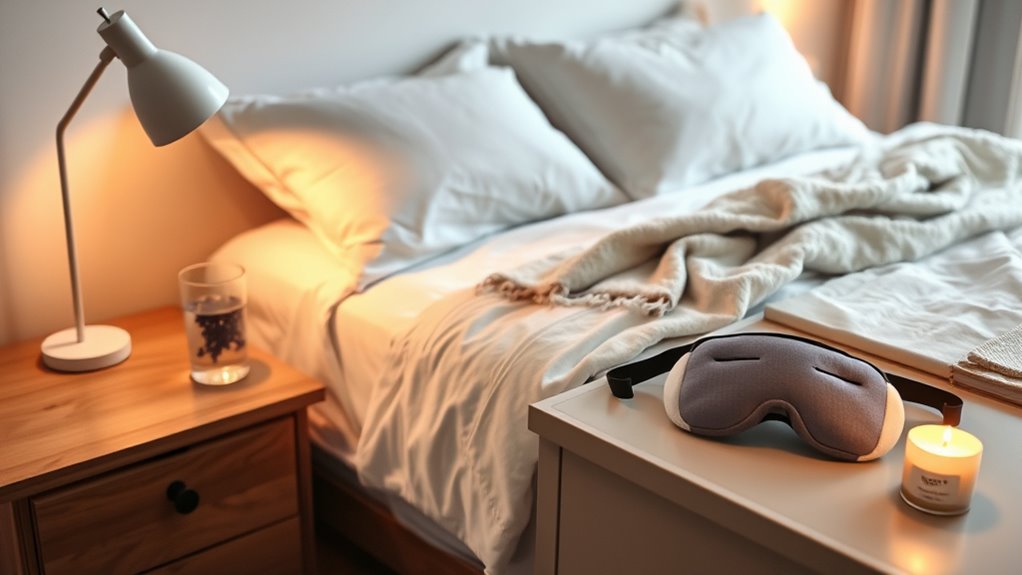To improve your sleep hygiene, stick to a consistent sleep schedule, even on weekends, and create a calming bedtime routine without screens. Make your bedroom dark, quiet, and cool to support restful sleep. Watch your intake of caffeine and heavy meals before bed, while managing stress through relaxation techniques like deep breathing. Keep track of your patterns and seek help if sleep issues persist. Stay with us to explore more tips for busy adults.
Key Takeaways
- Maintain a consistent sleep schedule, even on weekends, to regulate your circadian rhythm.
- Create a dark, quiet, and cool sleep environment to promote restful sleep.
- Establish relaxing, screen-free bedtime routines like gentle stretching or reading.
- Avoid heavy meals, caffeine, and alcohol close to bedtime to improve sleep quality.
- Track sleep patterns and seek professional help for persistent issues like insomnia or sleep apnea.
Establish a Consistent Sleep Schedule
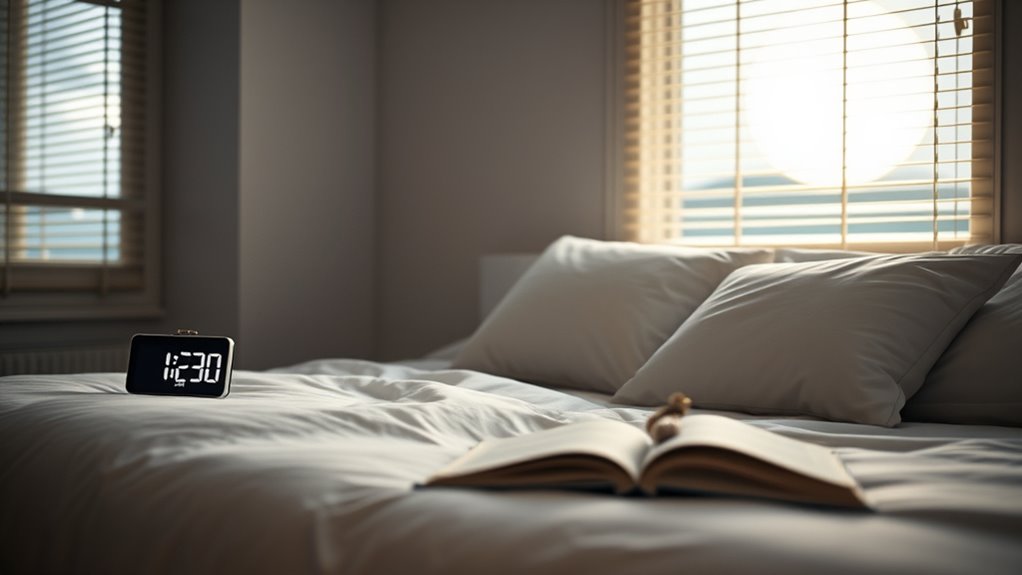
Establishing a consistent sleep schedule is essential, especially when your days are packed with responsibilities. When you go to bed and wake up at the same times daily, you help regulate your circadian rhythm, the internal clock that controls sleep-wake cycles. Disrupting this rhythm can lead to sleep disorders, making it harder to fall asleep or stay asleep. Staying consistent supports your body’s natural processes, ensuring better quality rest and increased alertness during the day. Even on weekends, try to keep your sleep and wake times similar; this minimizes disturbances to your circadian rhythm. Maintaining a steady schedule also positively impacts sleep quality, helping you feel more refreshed and energized. Additionally, understanding sleep hygiene practices can further enhance your rest by creating an optimal sleep environment. Consistent routines can also reduce sleep disturbances caused by irregular sleep patterns, leading to more restorative sleep. Over time, maintaining a steady schedule helps prevent sleep issues and promotes overall health, making it easier to face busy days with energy and focus. Embracing artistic expression and curiosity can also contribute to better sleep by reducing stress and fostering mental relaxation before bedtime.
Create a Relaxing Bedtime Routine

To signal to your body that it’s time to wind down, creating a relaxing bedtime routine is essential. This helps your mind and body prepare for restful sleep. Start by practicing mindful breathing, taking slow, deep breaths to calm your nervous system. Incorporate aromatherapy relaxation with calming scents like lavender or chamomile to enhance the atmosphere. To deepen your routine, consider:
Create a calming bedtime routine with mindful breathing and soothing scents for better sleep.
- Listening to soothing music or nature sounds
- Reading a calming book or journal
- Doing gentle stretches or yoga
- Dimming the lights to promote melatonin production
These practices create a peaceful environment, making it easier to shift from a busy day to a restful night. A consistent, relaxing routine signals your body that sleep is imminent, supporting better sleep hygiene.
Limit Screen Time Before Bed

Using screens before bed exposes you to blue light, which can disrupt your sleep cycle. Instead, try a screen-free routine with activities like reading or gentle stretching. These alternatives help you wind down and prepare your body for restful sleep. Incorporating relaxing flavor profiles such as herbal teas or calming music can further enhance your bedtime routine. Engaging in sleep hygiene practices can also improve overall sleep quality. Additionally, limiting screen time has become a crucial aspect of AI Safety efforts, as digital distractions can interfere with healthy sleep habits.
Blue Light Disruption
Blue light emitted by screens can profoundly disrupt your sleep cycle, making it harder to fall asleep and stay asleep. This blue light causes a disruption in your circadian rhythm, the natural internal clock that regulates sleep and wakefulness. When exposed to screens before bed, your brain perceives the light as daytime, suppressing melatonin production. As a result, your body remains alert longer, delaying sleep onset. To minimize blue light disruption, consider:
- Using blue light filters or glasses in the evening
- Reducing screen brightness before bed
- Setting a digital curfew an hour before sleep
- Engaging in relaxing, screen-free activities
Additionally, limiting exposure to artificial light sources in the evening can further support your circadian rhythm. Incorporating adaptive lighting that mimics natural light patterns can help reinforce your body’s internal clock. Furthermore, reducing overall light exposure in the hours before sleep can enhance melatonin production and improve sleep quality. Increasing awareness of light pollution and its effects can also help you create an environment conducive to restful sleep. These steps help preserve your circadian rhythm, making it easier to fall asleep naturally and improve overall sleep quality.
Screen-Free Bedtime Routine
Establishing a screen-free bedtime routine can considerably improve your sleep quality by helping your body wind down naturally. Instead of scrolling or watching screens, focus on relaxation techniques like reading, gentle stretching, or deep breathing. These activities signal to your brain that it’s time to relax, making it easier to fall asleep. Many sleep myths suggest that using screens late at night has no impact, but blue light exposure actually suppresses melatonin, disrupting your circadian rhythm. Cutting out screens before bed reduces this interference and promotes a more restful sleep. By avoiding devices, you give your mind the chance to unwind without distractions, helping you fall asleep faster and wake up feeling refreshed. Incorporating healthy sleep habits such as maintaining a consistent sleep schedule and creating a calming environment can further enhance your sleep quality. Regularly avoiding screens before bed and maintaining a consistent sleep schedule can help reinforce your body’s natural sleep-wake cycle. Additionally, understanding the impact of cybersecurity vulnerabilities can help you protect your personal data during your digital downtime, reducing stress and promoting better sleep. Consistently sticking to a screen-free routine establishes healthy habits that support your overall sleep hygiene.
Alternative Relaxation Activities
Incorporating alternative relaxation activities into your bedtime routine can considerably enhance your sleep quality by calming your mind without relying on screens. Engaging in mindful breathing helps you focus on each breath, reducing stress and promoting relaxation. Aromatherapy relaxation with calming scents like lavender or chamomile can create a peaceful environment, easing you into sleep. Consider these activities to deepen your relaxation:
- Practice mindful breathing exercises for 5-10 minutes
- Use essential oils for aromatherapy relaxation
- Read a calming book instead of scrolling through your phone
- Write in a journal to clear your mind before bed
These activities shift your focus away from screens, fostering tranquility and preparing your body for restful sleep. Incorporating sleep hygiene practices like avoiding stimulating activities can further improve your sleep quality. Developing a consistent bedtime routine that includes these activities helps signal your body to wind down, making it easier to fall asleep. Steadily building a soothing bedtime routine that includes these activities works well for your busy lifestyle.
Optimize Your Sleep Environment
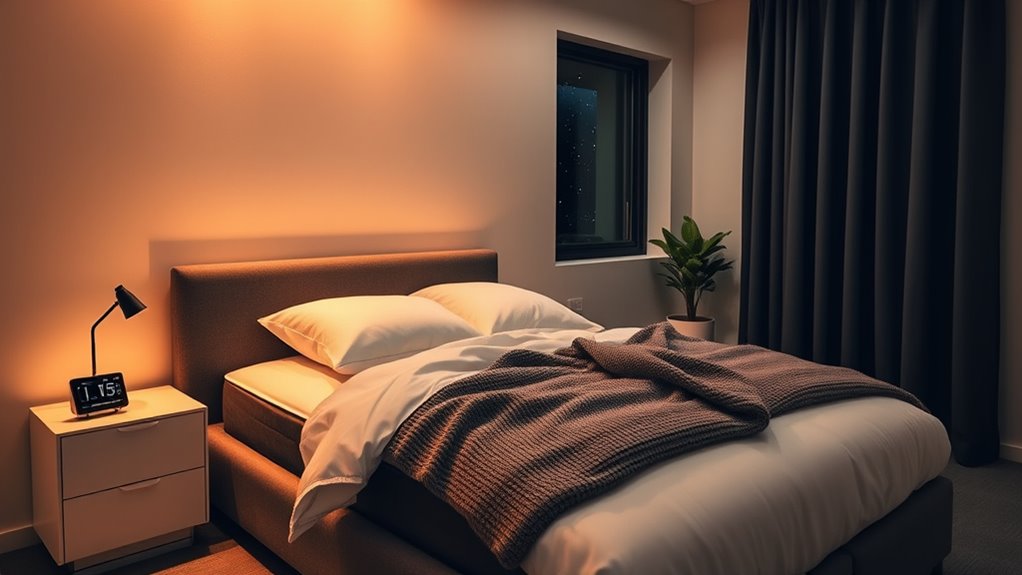
Make your bedroom a dark, quiet sanctuary to help you fall asleep faster. Adjust the room temperature so it’s cool and comfortable, not stuffy or chilly. When you create the right environment, you’ll set the stage for restful, uninterrupted sleep. Incorporating natural light control can further enhance your sleep quality by minimizing disturbances. Ensuring good sleep hygiene habits can also support your overall restfulness. Additionally, reducing automation distractions in your sleeping area can help prevent disruptions during the night. Be aware that lifevest advisors recommend thorough research and secure practices to protect your assets, which can also help you establish a sense of security conducive to better sleep.
Create a Dark, Quiet Space
Creating a dark, quiet sleep environment is essential for maintaining restful sleep, especially when your schedule keeps you busy. A dark room helps your body produce melatonin, signaling it’s time to rest, while a quiet atmosphere minimizes disruptions. To achieve this, consider using blackout curtains or an eye mask to block out light. Use earplugs or a white noise machine to drown out background noise. Keep electronics away from your bedroom, as screens emit light that can interfere with melatonin production. Remember, a consistent sleep environment trains your body to recognize when it’s time to wind down. Incorporating HEPA filtration can further improve air quality, reducing allergen exposure that might disturb your sleep. Creating this calm, dark space guarantees uninterrupted sleep, allowing you to wake refreshed and ready to tackle your busy day. Additionally, maintaining a consistent sleep schedule helps reinforce your body’s natural circadian rhythms, making it easier to fall asleep each night. Ensuring your sleep environment is free from airborne allergens can also promote more restful sleep, especially for those with sensitivities. Moreover, selecting appropriate sleepwear made from breathable fabrics can enhance comfort and support better sleep quality.
Adjust Room Temperature Properly
Adjusting your room temperature is essential for falling asleep quickly and staying asleep throughout the night. The right room temperature promotes ideal sleep comfort, helping your body relax and shift into rest. Experts recommend keeping your bedroom between 60-67°F (15-19°C), as cooler temperatures signal your body it’s time to sleep. If your room is too warm, you may struggle with tossing and turning; if it’s too cold, you’ll find it hard to settle in. Use a thermostat, fans, or a space heater to fine-tune the environment. Avoid drastic changes, and aim for a consistent temperature that feels comfortable. Prioritizing proper room temperature creates an inviting sleep setting, ensuring you wake refreshed and ready for the day ahead.
Be Mindful of Food and Beverage Intake
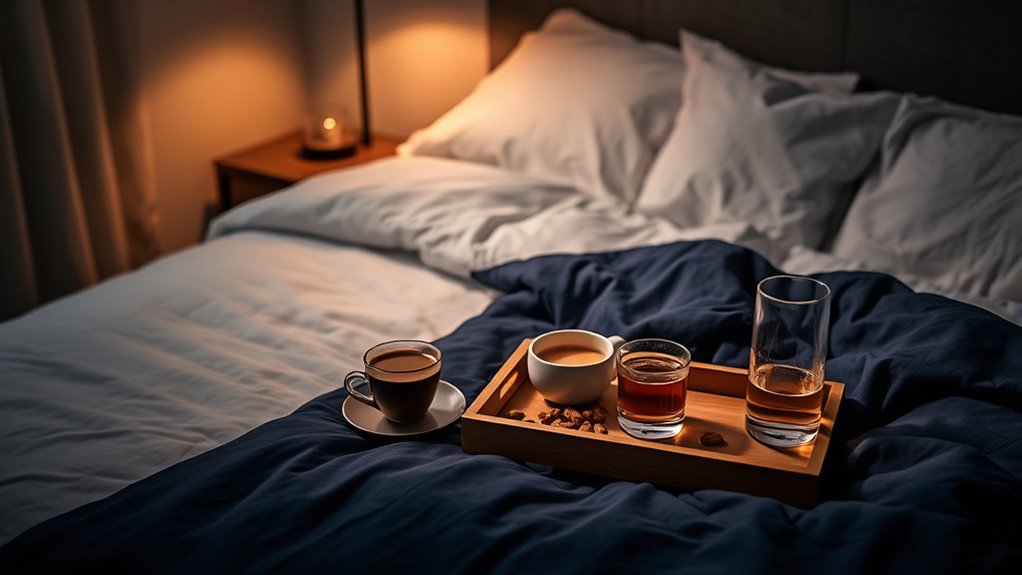
What you eat and drink before bed can considerably impact your sleep quality. Avoid heavy meals or caffeine late in the evening, as they disrupt rest. Instead, focus on healthy snacking and appropriate meal timing to promote better sleep.
Consider these tips:
- Choose light, nutrient-rich snacks like nuts or yogurt
- Limit caffeine and alcohol intake close to bedtime
- Finish meals at least 2-3 hours before sleeping to aid digestion
- Opt for calming beverages such as herbal tea without caffeine
Being mindful of what and when you eat helps regulate your sleep cycles. Proper meal timing prevents discomfort and indigestion, while healthy snacking supports relaxation. Small dietary adjustments can make a significant difference in your nightly rest.
Incorporate Physical Activity During the Day
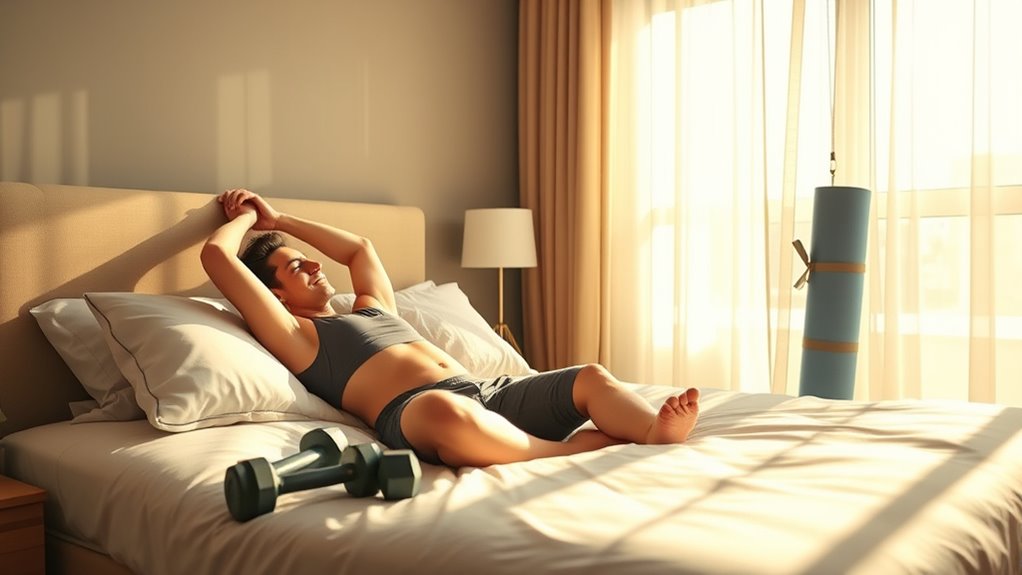
Incorporating physical activity into your daily routine can substantially improve your sleep quality. Engaging in regular daytime exercise helps regulate your internal clock, making it easier to fall asleep and stay asleep. Even short bursts of physical activity, like brisk walks or stretching, boost your energy levels and reduce daytime fatigue. Aim to finish vigorous workouts at least a few hours before bedtime to prevent overstimulation. Consistency is key—try to set aside time each day for physical activity that fits your schedule. Not only does this improve your overall health, but it also fosters a more restful night’s sleep. Remember, even small efforts toward increased daytime exercise can make a significant difference in your sleep hygiene.
Manage Stress and Practice Relaxation Techniques
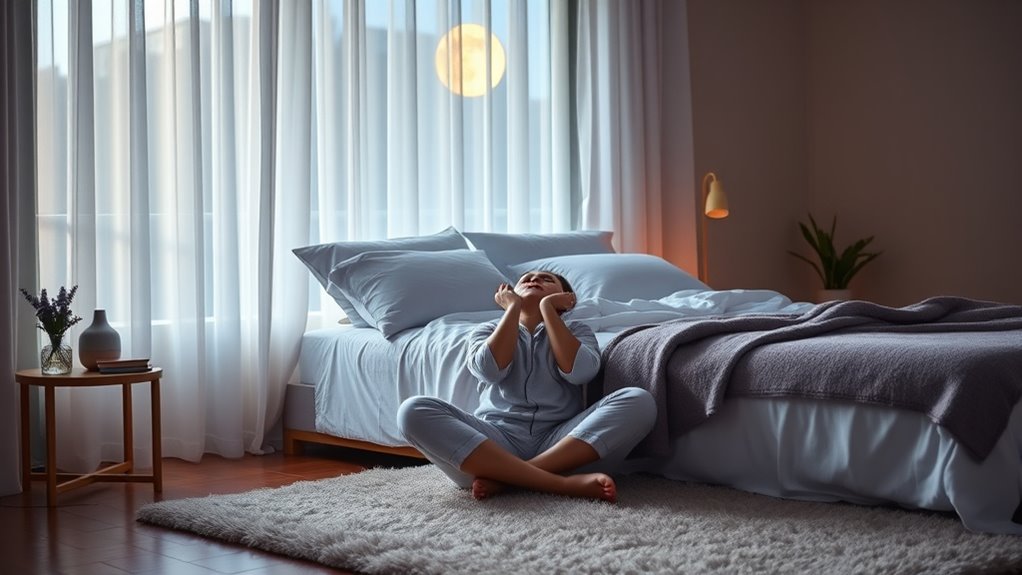
Managing stress effectively is essential for achieving better sleep, especially when your days are busy and overwhelming. Incorporating relaxation techniques can make a significant difference. Try practicing mindfulness meditation to center your mind and reduce anxiety. Deep breathing exercises help calm your nervous system and signal your body it’s time to unwind. To deepen your relaxation, consider:
- Setting aside a few minutes daily for mindfulness meditation
- Focusing on slow, deep breaths during stressful moments
- Creating a calming pre-sleep routine
- Using guided relaxation apps for structured practice
These techniques help lower cortisol levels, promote mental clarity, and prepare your body for restful sleep. Consistently managing stress not only improves your sleep quality but also enhances your overall well-being and resilience amidst a hectic schedule.
Limit Naps and Keep Them Brief
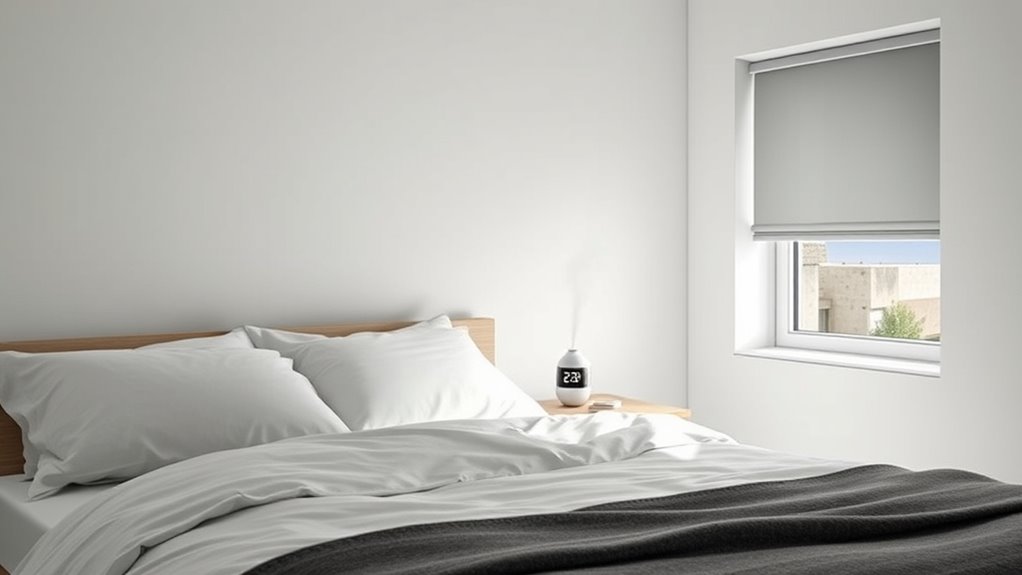
While relaxation techniques can help reduce stress and prepare your mind for sleep, long or unplanned naps during the day can disrupt your nighttime rest. To avoid this, limit your naps to around 20 minutes—these are often called power naps and can boost your energy without causing sleep inertia. If you’re experiencing sleep debt, short naps can help, but oversleeping may make falling asleep at night harder. Keep naps brief and purposeful, ideally before 3 p.m., to prevent interfering with your main sleep schedule. Remember, long naps can create a cycle of sleep deprivation, making it harder to maintain consistent, restorative sleep at night. Staying mindful of nap length and timing helps you stay on track for better sleep hygiene.
Keep a Sleep Journal to Track Patterns
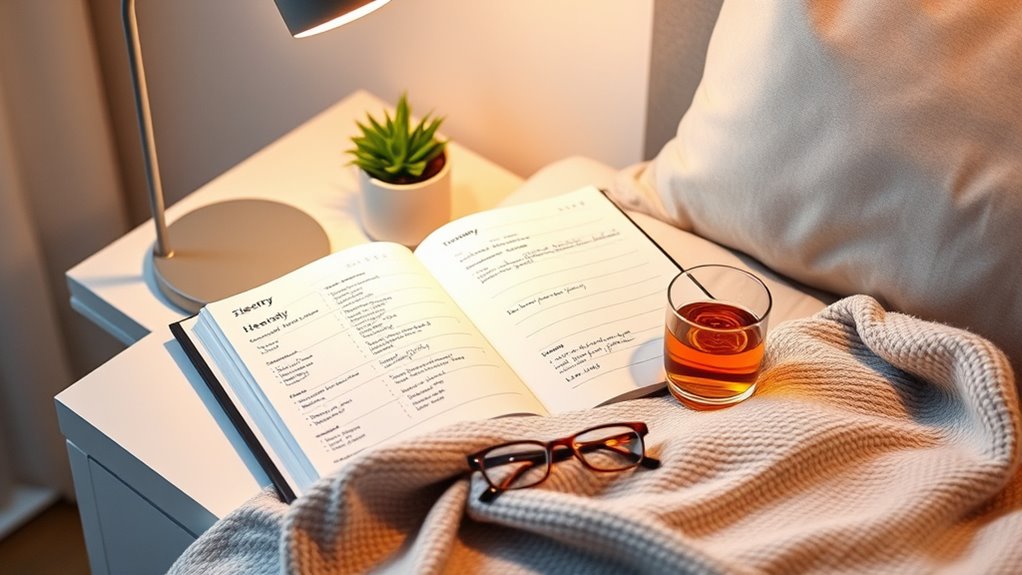
Keeping a sleep journal helps you spot what’s working and what isn’t. Record your bedtime routines, note how well you sleep, and look for patterns that might disrupt rest. This simple step gives you clear insights to improve your sleep habits.
Record Bedtime Routines
Creating a sleep journal is a simple yet effective way to identify patterns and habits that affect your bedtime routine. By tracking your sleep diary, you can observe how different bedtime rituals influence your sleep quality. Record details like the time you go to bed, activities before sleep, and how you feel upon waking. This helps you spot habits that may disrupt restful sleep. Consider these insights:
- Skipping relaxing activities may lead to restless nights
- Screen time before bed can delay sleep onset
- Caffeine or heavy meals close to bedtime disrupt sleep patterns
- Consistent routines promote better sleep quality
Keeping a detailed sleep diary allows you to fine-tune your bedtime rituals, ensuring they support restful sleep. Regularly reviewing your entries helps you identify what works and what needs changing.
Note Sleep Quality
Tracking your sleep quality is essential for understanding how your habits and environment affect your rest. Keeping a sleep journal helps you notice patterns and identify factors impacting your sleep quality. Many sleep quality myths suggest quick fixes, but consistent tracking reveals real improvements over time. Use your journal to record sleep duration, wake times, and how rested you feel. This data highlights whether your sleep quality is improving or if certain habits disrupt your rest. Remember, sleep quality improvements often come from small, steady changes.
| Sleep Quality Myths | Sleep Quality Improvements |
|---|---|
| Sleep duration equals quality | Consistent routines boost rest |
| Nightly wake-ups ruin sleep | Tracking reveals progress |
| Sleep aids fix everything | Awareness leads to better habits |
| All sleep is equal | Personal patterns matter |
Identify Disruptive Patterns
By maintaining a sleep journal, you can identify patterns that disrupt your rest, especially when you pay close attention to daily habits and environmental factors. Tracking your sleep helps reveal how nighttime noise or sleep disruptions affect your quality of rest. Notice if certain activities or stressors lead to restless nights or early awakenings. Record when you experience trouble falling asleep or staying asleep. Recognize recurring issues like consuming caffeine late or exposure to bright screens before bed. By identifying these patterns, you can make targeted changes.
- Nighttime noise levels that disturb your sleep
- Late-night screen time causing sleep disruptions
- Stress or anxiety spikes before bedtime
- Inconsistent sleep schedule affecting overall rest
Seek Professional Help When Necessary

If sleep problems persist despite your best efforts to improve habits, seeking professional help is essential. Persistent sleep issues might indicate a sleep disorder, which requires proper diagnosis and treatment. A professional consultation can identify underlying conditions like insomnia, sleep apnea, or restless leg syndrome that may be disrupting your rest. Ignoring these signs can lead to long-term health consequences, including fatigue, decreased focus, and weakened immunity. Don’t hesitate to reach out to a healthcare provider or sleep specialist if your sleep difficulties continue. They can conduct assessments, recommend appropriate therapies, or suggest lifestyle adjustments tailored to your needs. Early intervention can restore healthy sleep patterns, ensuring you wake up refreshed and ready for your busy day.
Frequently Asked Questions
How Does Caffeine Intake Affect Sleep Quality?
Caffeine intake can substantially impact your sleep quality, especially if you consume it late in the day. Caffeine timing matters because drinking it too close to bedtime can delay sleep onset and reduce restfulness. If you’re experiencing poor sleep, consider caffeine withdrawal gradually to avoid withdrawal symptoms. Limiting caffeine earlier in the afternoon helps your body wind down naturally, leading to more restorative sleep and better overall health.
Can Certain Medications Interfere With Sleep Hygiene?
Many medications can cause major mishaps with your sleep routine. Medication side effects like insomnia, restlessness, or vivid dreams can lead to significant sleep disruption. You might notice that certain prescriptions interfere with your nightly rest, making it harder to fall asleep or stay asleep. Always ask your healthcare provider about potential sleep side effects and avoid self-medicating to maintain a peaceful, productive sleep pattern.
What Are Signs of a Sleep Disorder?
You might notice signs of a sleep disorder if you frequently struggle to fall asleep, stay asleep, or feel tired during the day. Conditions like sleep apnea cause interrupted breathing, while restless legs make you feel uncomfortable and twitchy at night. You could also experience loud snoring, abrupt awakenings, or unrefreshing sleep. If these symptoms persist, it is crucial to consult a healthcare professional to identify and treat the underlying issue.
How Do Shift Work and Irregular Hours Impact Sleep Hygiene?
Imagine working night shifts and struggling to stay alert. Your irregular hours cause circadian disruption, throwing off your sleep cycle. This can lead to poor sleep quality and increased fatigue. To manage fatigue, prioritize consistent sleep routines when possible, use blackout curtains, and limit caffeine. Shift work challenges your sleep hygiene, but with targeted fatigue management strategies, you can improve rest and stay healthier despite irregular hours.
Are Herbal Supplements Effective for Better Sleep?
Herbal supplement efficacy varies, but many find natural sleep aids helpful for improving sleep quality. You might try melatonin, valerian root, or chamomile to support relaxation and ease into rest. While these remedies can be effective, remember they’re not a cure-all. Use them cautiously, and consult a healthcare professional if you have underlying health conditions or take medications. Incorporating natural sleep aids can complement good sleep habits for better rest.
Conclusion
Think of your sleep habits as the roots of a sturdy tree. When you nurture them with consistency and care, your whole well-being flourishes. Even during busy days, tending to these roots keeps you grounded and resilient. Remember, small daily adjustments are like watering and pruning—creating a strong foundation that supports your health and vigor. With patience and persistence, you’ll cultivate a restful, revitalizing sleep that helps you thrive.

